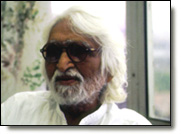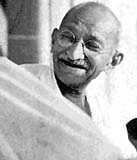Commentary / Vir Sanghvi
The campaign against Husain makes every Hindu feel small
 Iam not going to bore you with the traditional liberal case for
M F Husain and his paintings of Indian goddesses. By now, we
all know that the paintings are not obscene-- nudity is not the
same as vulgarity -- and are unlikely to cause offence to anybody
except perhaps for those VHP/Shiv Sena members who believe that
the approved dress code for heaven is khaki knickers.
Iam not going to bore you with the traditional liberal case for
M F Husain and his paintings of Indian goddesses. By now, we
all know that the paintings are not obscene-- nudity is not the
same as vulgarity -- and are unlikely to cause offence to anybody
except perhaps for those VHP/Shiv Sena members who believe that
the approved dress code for heaven is khaki knickers.
As for the arguments for freedom of artistic expression etc.,
we've been through all that too often before. All you need to
is dig out any of the articles that my colleagues and I have written
about The Satanic Verses over the last five years. Substitute
'paining' for 'book' and 'Husain' for 'Rushdie' and the case remains
the same.
My point this week is entirely different. I object to what the
Shiv Sena and the Sangh Parivar are doing not because I'm a liberal
(any liberal who expects better from this lot must be an idiot)
but because I'm a Hindu.
It is difficult to say this without sounding politically incorrect:
but there is no doubt that in some deep, almost subconscious sense,
we Hindus regard ourselves as being followers of the world's greatest
religion. It isn't just that Hinduism predates Christianity by
thousands of years (and Christianity predates Islam) or that its
essential themes of the primacy of the soul and the universality
of creation are far more complex than the our-messiah-showed-the-way
approach of most other religions.
It is more that Hinduism-- despite such medieval developments
as the caste system-- remains in individualistic religion. We
are content to let each other be. There is no crusading church,
there are no mad mullahs, and there is no hysterical clergy to
lay down the law. Our beliefs are personal, not congregational.
With the individual approach comes a certain kind of tolerance.
it is almost a truism to say that the reason why India remains
one of the few populous democracies in the Third World is because
it is largely Hindu. Democracy is about tolerance, about respecting
the other person's right to be and to believe. Hinduism is about
the same things.
The greatness of the Hindu approach is that it can shape a secular
political tradition without narrowing its scope. What could have
been more Hindu than Gandhiji's movement? And yet, there was not
a single element of sectarianism or communalism in his appeal.
When he died it was because of narrow-minded Hindus who objected
to this absence of sectarianism. Nevertheless, with his last words
-- Hey Ram, Hey Ram -- he affirmed his faith in the greater
Hindu tradition.
 It is no secret that there have always been those -- followers of
the Hindu Mahasabha or Nathuram Godse, for example -- who reject
the tolerance and individualism of Hinduism and want it to take
on a narrower, more militaristic form.
It is no secret that there have always been those -- followers of
the Hindu Mahasabha or Nathuram Godse, for example -- who reject
the tolerance and individualism of Hinduism and want it to take
on a narrower, more militaristic form.
Six years ago, Dr Karan Singh memorably described the organised
hysteria of the anti-Babri Masjid movement as an example of the
semitisation of Hinduism. It is one of the lasting ironies of
sectarian conflict in this country that many of those who attack
Islam regret only that Hinduism is not more like Islam itself.
There is a reason for this. An organised religion, with a clergy or a church,
also lends itself more to political organisation. It was easy
enough for Iran's Shia mullahs to make themselves the focus of
opposition to the Shah. And in Northern Ireland, the division
between the Catholic and Protestant churches has made it easier
for the political battle to be conducted.
|





 Iam not going to bore you with the traditional liberal case for
M F Husain and his paintings of Indian goddesses. By now, we
all know that the paintings are not obscene-- nudity is not the
same as vulgarity -- and are unlikely to cause offence to anybody
except perhaps for those VHP/Shiv Sena members who believe that
the approved dress code for heaven is khaki knickers.
Iam not going to bore you with the traditional liberal case for
M F Husain and his paintings of Indian goddesses. By now, we
all know that the paintings are not obscene-- nudity is not the
same as vulgarity -- and are unlikely to cause offence to anybody
except perhaps for those VHP/Shiv Sena members who believe that
the approved dress code for heaven is khaki knickers.
 It is no secret that there have always been those -- followers of
the Hindu Mahasabha or Nathuram Godse, for example -- who reject
the tolerance and individualism of Hinduism and want it to take
on a narrower, more militaristic form.
It is no secret that there have always been those -- followers of
the Hindu Mahasabha or Nathuram Godse, for example -- who reject
the tolerance and individualism of Hinduism and want it to take
on a narrower, more militaristic form.